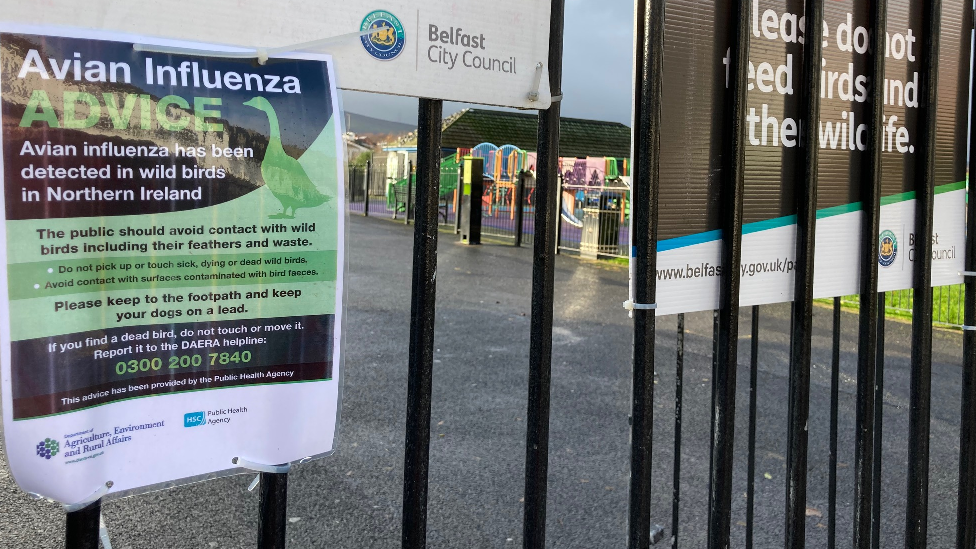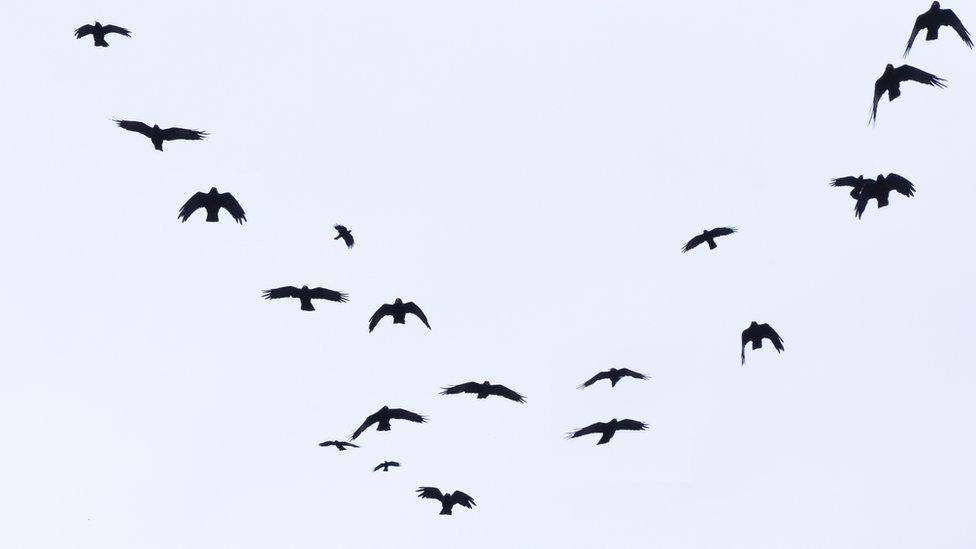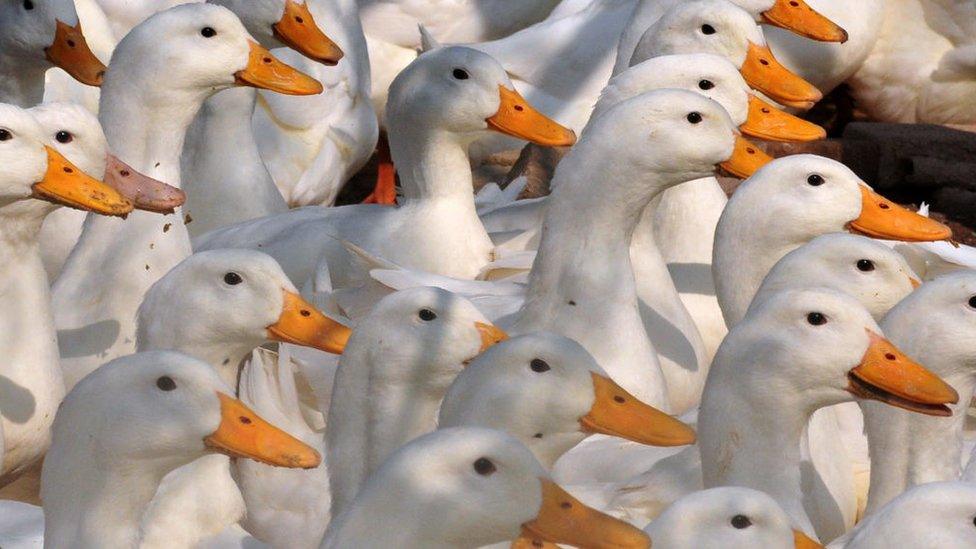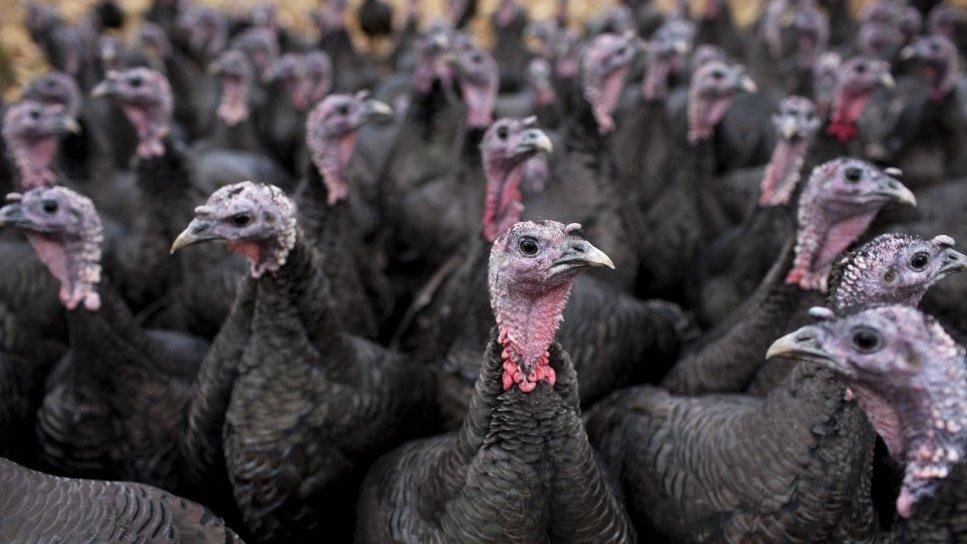Waterworks: Belfast park closed due to avian flu outbreak
- Published

The council said the Waterworks Park "has been temporarily closed until further notice"
A park in north Belfast has been closed due to an outbreak of avian flu, the city council has announced.
Belfast City Council said the Waterworks Park "has been temporarily closed until further notice".
A spokesman said that 16 dead birds had been removed from the park in recent days.
Meanwhile, Agriculture Minister Edwin Poots has said Northern Ireland could face a compensation bill of tens of millions of pounds due to avian flu.
Mr Poots said it was a very virulent strain of the virus that could wipe out entire flocks.
Don't go to park
An independent expert has been brought in to help manage the situation at Waterworks Park, said Belfast City Council, which is also working with the Department of Agriculture Environment and Rural Affairs (DAERA) and the Public Health Agency (PHA).
"We are also arranging for an on-call vet to be available to assess sick and dying birds and, if required, humanely euthanise these birds," said a spokesman.
The spokesman said that park wardens were removing any dead birds from the site and that the main species affected at the Waterworks were swans.
"As the outbreak continues to escalate across Northern Ireland, as a precautionary approach the Waterworks Park will close until further notice," he said.
Members of the public are asked not to visit Waterworks Park.
Animal rescue volunteer Sean Cummins said dead birds had been removed from the park, and that he had seen "numerous swans spinning around sick".
"Once they get sick they start hitting their head off walls, because basically their brains swell," he told BBC NI's The Nolan Show.
"The public are walking by past watching this thinking they're drowning, so they're grabbing the birds out of the water, risking themselves possibly contracting that virus."

Agriculture Minister Edwin Poots said avian flu could cost Northern Ireland tens of millions of pounds
Mr Poots said that the compensation cost could be up to £1m for some large flocks.
"We have a huge population of fowl in Northern Ireland, very successful in terms of our commercial production of poultry and indeed eggs," Mr Poots sad.
"I don't think it will run into hundreds of millions [the compensation bill] but certainly it has the potential to run into tens of millions.
"Whenever there is a crisis we have to find the money and that's just the circumstance we find ourselves in.
"All of this we will do our best to avoid and we will take stringent bio-security measures."
The minister said the threat is likely to last for three to four months before migratory birds return to their native lands.

What is avian influenza?
Avian influenza (AI), commonly known as bird flu, is a highly contagious viral disease.
It affects the respiratory, digestive and/or nervous system of many species of birds.
Symptoms can include head swelling, closed and excessively watery eyes, lethargy, unresponsiveness, incoordination and loss of balance, head and body tremoring, drooping of the wings and/or dragging of legs, twisting of the head and neck, marked reduction in egg production and respiratory distress such as gaping (mouth breathing), nasal snicking (coughing sound), sneezing, gurgling or rattling.
It spreads from bird to bird by direct contact or through contaminated body fluids and faeces.
It can also be spread by contaminated feed and water or by dirty vehicles, clothing and footwear.
The avian influenza virus changes frequently, creating new strains. It is not an airborne virus.
The UK Health Security Agency (UKHSA) says that avian influenza is primarily a disease of birds and the risk to the general public's health is very low.

Last week, 27,000 ducks were culled after an outbreak in Aughnacloy, County Tyrone.
Suspected cases were also found in a "backyard flock" in Broughshane in County Antrim.
Three kilometre protection zones and 10km surveillance zones have been declared around both premises.
On Sunday, the department confirmed that avian flu had also been detected in six wild birds found in Belfast Waterworks, Harbour Estate and in Carryduff.
Videos have circulated on social media of birds apparently in distress at Waterworks park.
'High risk'
In a statement on Wednesday, a DAERA spokesman said the department was aware of reports of dead and sick wild birds in the Belfast area.
"To date in this current outbreak, avian influenza H5N1 has been confirmed in six wild birds in Northern Ireland (NI).
"Unfortunately, native wild birds that come into contact with infected migratory birds, are at a high risk of catching the disease.
"The Public Health Agency has issued advice that the public should not touch dead or sick birds."
It followed the identification of a number of suspected cases in commercial, privately-owned and wild birds.
Related topics
- Published4 December 2021

- Published2 December 2021

- Published22 November 2021
